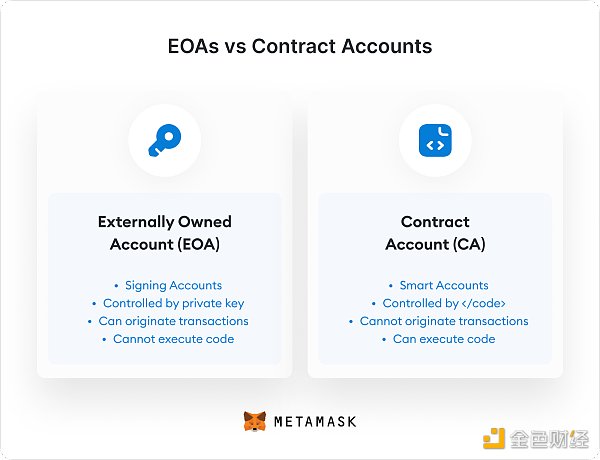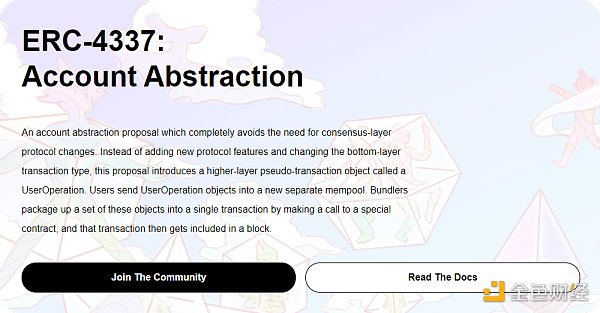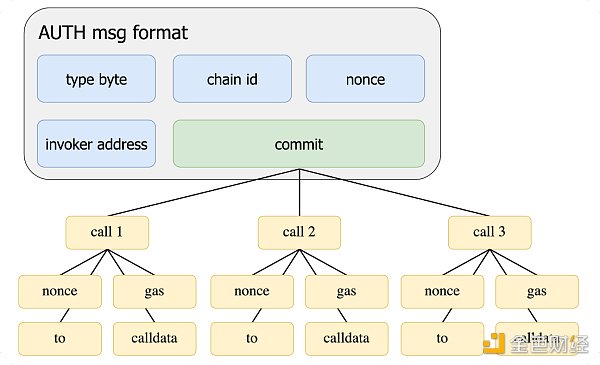Author: William M. Peaster, Bankless; Compiler: Deng Tong, Golden Finance
There is a lot of discussion in the cryptocurrency field about the new Ethereum Improvement Proposal (EIP) - EIP-3074 has become the focus of attention focus, as Ethereum core developers have just approved the inclusion of the standard in the upcoming Pectra hard fork, which will go live later this year or early 2025.
EIP-3074 is the next important step in the development of Ethereum’s future account model. This was a short-term fix before the rise of ERC-4337, but the user experience (UX) improvements are significant.
Basic knowledge of account abstraction
Externally owned account (EOA) is the most basic form of Ethereum account, which is directly controlled by the private key and does not require associated code. EOAs can send ETH and interact with smart contracts, but they lack more complex functionality.
Unlike EOA, Smart Contract Accounts (SCA) are directly controlled by their contract code, through which users can hold and control funds based on their programmed logic, make automated decisions based on other contract calls, and more. This makes SCA extremely versatile and the future of wallets.

In this context , Account Abstraction (AA) refers to a series of development efforts aimed at making Ethereum accounts more flexible. The goal is to reduce the differences between EOA and SCA, making account behavior more programmable and able to meet a wider range of user needs.
Ethereum’s AA roadmap
Ethereum’s AA roadmap includes multiple solutions to address different challenges Work in parallel.
Today, the consensus on the main path forward is deeper acceptance of ERC-4337, an AA standard that supports a wide range of features not typically available to EOAs, such as paying gas fees in tokens other than ETH , complex account recovery mechanisms, and more advanced transaction batching and scheduling functions.

However, ERC- 4337 can and will be supplemented by other approaches, such as EIP-5003 (a proposed approach to permanently transition from EOA to SCA) and EIP-3074 (which would pave the way for allowing EOAs to delegate transaction execution rights to SCA).
What is EIP-3074?
EIP-3074 introduces new Ethereum opcodes. The system will allow EOA users to authorize smart contracts to perform actions on their behalf within a single transaction, while retaining the security and control of not permanently transferring their private keys.
User-friendly utilities brought by these new opcodes include:
Transaction batching - Batch multiple transactions (such as many token transfers) into a single operation.
Sponsored Transactions - With the ability to have transactions paid for by a third party, applications open up a new way for their users to pay for gas.
Conditional transactions - complex transaction structures that can link multiple steps and enable conditional execution, as if certain conditions are met Execute transactions without requiring separate transactions for each step.
Meta Transactions - The ability to sign transactions that can be submitted by another party, for example, offline or from a different interface, without requiring ETH as fuel.
Delegated Security - By allowing trusted callers to manage transactions, users can benefit from an advanced security model, for example involving multi-signature setups model.

Taken together, these features could lead to a range of user experience improvements, such as a DAO sponsoring transactions for its members or a wallet launching automated payments, subscription services and programmatic withdrawals.
On the other hand, EIP-3074 will also introduce considerable security risks, such as new users making mistakes by misunderstanding how the new caller system works, or compromised callers performing unauthorized actions. trade. However, these issues can be solved by wallets that implement clear messaging around EIP-3074 signatures.
Future Outlook
While ERC-4337 focuses on creating a powerful off-chain transaction relay network and is the current leader of the Ethereum AA roadmap, EIP- 3074 allows for more direct on-chain flexibility and execution abstraction via existing EOAs.
Both are steps towards full AA, but serve different needs in the Ethereum ecosystem in different ways. How smoothly EIP-3074 integrates into the existing Ethereum ecosystem and its reception by wallets and applications will be critical, and continued improvements to address security concerns and ensure secure, user-friendly operation will be key going forward.
 JinseFinance
JinseFinance




